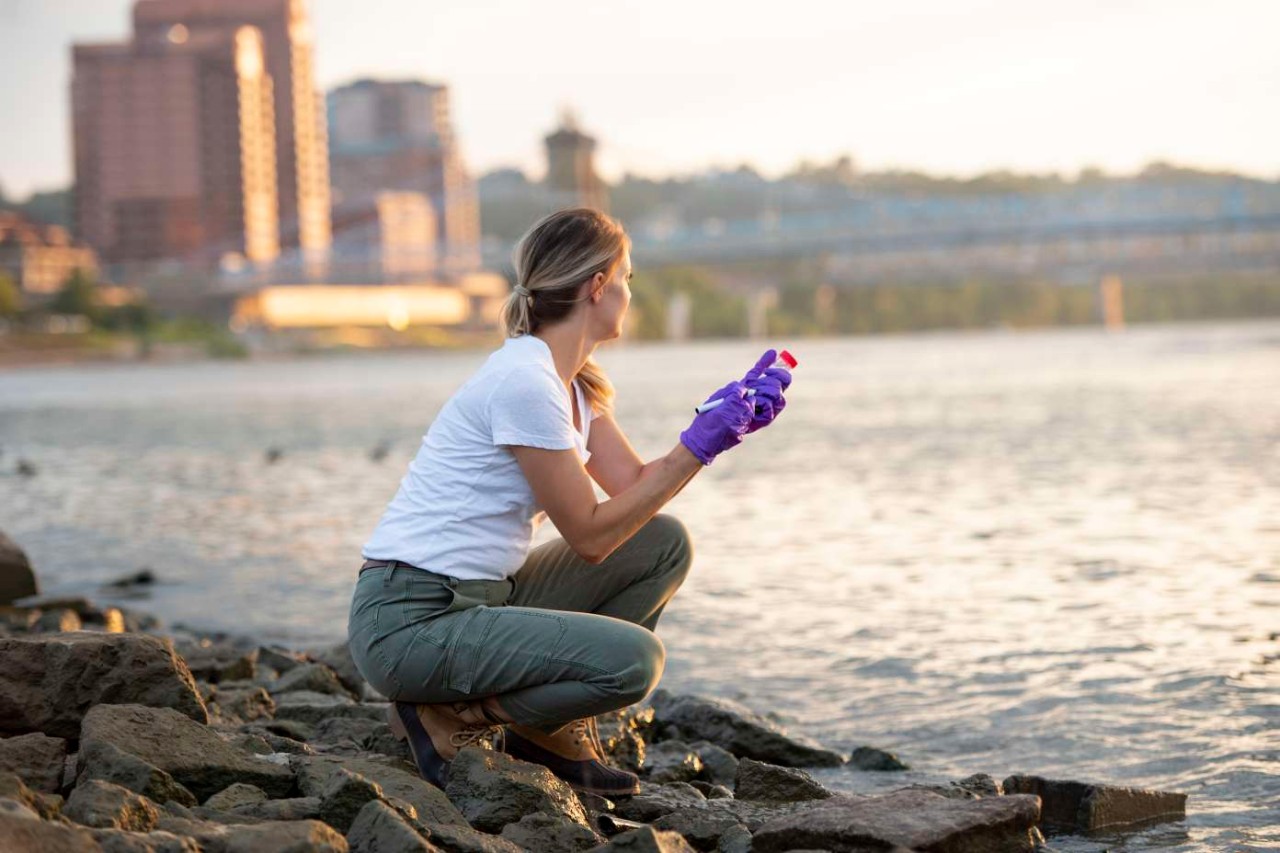
UC hosts environmental justice talk on 'Dark Waters'
National experts will help educators frame curricular development around pollution case
The University of Cincinnati will host the inaugural Environmental Justice and Advocacy Symposium for educators Feb. 5 that will look at a decadeslong pollution case involving a Fortune 500 company and a group of synthetic chemicals known as PFAS.
UC professor Bob Hyland will moderate a panel of environmental research experts and advocacy groups and a Cincinnati lawyer who raised public awareness about the health dangers of fluorinated pollutants. Hyland said the panelists will use the case to discuss ways educators can create a leading undergraduate curriculum around environmental justice.
Often called “forever chemicals,” PFAS are found in products as diverse and ubiquitous as umbrellas, tents, carpets, cookware and firefighting foam. But studies have found the chemicals are toxic and have been linked to birth defects, cancer and thyroid disease.
“I wanted something of local interest and global importance,” symposium organizer Hyland said.

Bill Camp, left, and Mark Ruffalo star in "Dark Waters," a 2019 movie about a legal fight over chemical pollution in Ohio and West Virginia. UC will host a symposium for educators Friday about improving curricula for environmental justice and advocacy featuring speaker and Cincinnati attorney Rob Bilott, whom Ruffalo depicts in the film. Photo/Focus Features
Panelists include environmental lawyer Rob Bilott of the Cincinnati firm Taft, Stettinius & Hollister, whose legal work against chemical maker DuPont was depicted in the 2019 Mark Ruffalo movie “Dark Waters.” The film chronicles Bilott’s yearslong civil case involving a West Virginia farmer whose livestock allegedly were poisoned by toxic runoff of DuPont chemicals. DuPont also faced a class-action pollution complaint filed by 80,000 residents of Ohio and West Virginia.
DuPont in January announced a $4 billion resolution of legal claims relating to environmental liability for pollution from its handling of PFAS.
“Mr. Bilott is a local hero and an internationally recognized expert in environmental liability relating to PFAS exposure,” Hyland said.
Panelist Susan Pinney, an epidemiologist in UC’s College of Medicine, found in a 2017 study that residents in parts of Ohio had higher-than-normal levels of these chemicals in blood samples taken over a 22-year span, likely caused by contamination in drinking water.
In breakout sessions, panelists will be joined by other members of the Environmental Justice Interdisciplinary Faculty Team at UC: Lora Arduser (English), Nicholas Dunning (geography), Professor Leah Stewart (English), David Stradling (history), and Susanna Tong (environmental studies).
In congressional hearings on PFAS in 2019, DuPont said it was committed to environmental cleanups of sites where it produced or disposed of the chemicals. And it recommended a clearinghouse to share best practices to detect, measure and clean up the chemicals that it produced.
Democratic U.S. Rep. Harley Rouda of California called PFAS an urgent environmental and health concern.
“This is not a small or emerging or ambiguous problem. This is a full-blown crisis,” Rouda said.
Hyland said UC’s interdisciplinary approach to research and pedagogy creates a formidable public resource.
“We have experts at UC who are uniquely positioned to address these issues,” Hyland said. “That’s why for so many reasons UC is poised to be a leader on environmental justice curriculum. Students from across disciplines regularly articulate to us that they want to pursue careers in the environmental justice space.”
Panelists include:
- Rob Bilott, environmental attorney with Taft, Stettinius & Hollister
- Linda Birnbaum, former director of the National Institute for Environmental Health Sciences at the National Institutes of Health
- Kacee Deener, deputy director of the Environmental Protection Agency’s Office of Science Advisor, Policy and Engagement
- Susan Pinney, professor and epidemiologist in UC’s Department of Environmental Health
- Marilyn Wall, Sierra Club
- Emily Donovan, co-founder of North Carolina advocacy group Clean Cape Fear
Featured image at top: A UC student takes a water sample on the Ohio River. UC will host the inaugural Environmental Justice and Advocacy Symposium for educators Feb. 5. Photo/Colleen Kelley/UC Creative + Brand
Impact Lives Here
The University of Cincinnati is leading public urban universities into a new era of innovation and impact. Our faculty, staff and students are saving lives, changing outcomes and bending the future in our city's direction. Next Lives Here.
Stay up on all UC's COVID-19 stories, or take a UC virtual visit and begin picturing yourself at an institution that inspires incredible stories.
Related Stories
WLWT: Tips to fight off bad allergy symptoms
April 18, 2024
The University of Cincinnati's Ahmad Sedaghat spoke with WLWT about how Cincinnati's geography tends to make allergy symptoms worse and tips to fight off those symptoms.
UC’s Ground Floor Makerspace births combat robots
April 17, 2024
In the heart of UC's 1819 Innovation Hub lies the Ground Floor Makerspace, an advanced and active hub of ingenuity where students, faculty and the community converge to bring their ideas to life. This includes being the birthplace of robots much like miniature race cars, combating fender to fender in an enclosed boxing ring. Combat robots like UC's Maximizer will again be fighting for first place in the National Havoc Robot League (NHRL) competition, slated for April 20.
Medscape: Skin adverse events rare after immunotherapy to treat...
April 17, 2024
Medscape highlighted University of Cincinnati research published in JAMA Dermatology that found skin adverse events were rare following immunotherapy treatments for certain skin cancers.
